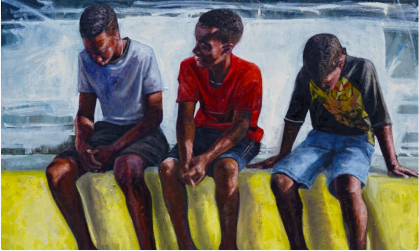Picturing Community: Alonzo Adams and Mercy Romero

Join us for an exciting evening between New Jersey artist Alonzo Adams and scholar Dr. Mercy Romero for an interdisciplinary conversation where we consider how we engage with, represent, and share stories from different communities. After the conversation, visit the Stedman Gallery where Alonzo Adam’s exhibit “These Eyes Have Seen” is featured and enjoy a reception and continued conversation.
This event is free and open to the public. Registration is strongly encouraged. Food and drink is provided.
Presented as a partnership between The Rutgers-Camden Center for the Arts and the Mid-Atlantic Regional Center for the Humanities.
About Alonzo Adams
Alonzo Adams (b. 1961) is a painter raised in Plainfield, New Jersey. He earned a BFA from Rutgers-New Brunswick, Mason Gross School of the Arts in 1984 and an MFA from University of Pennsylvania in 1991. His work has been featured in many venues, including Howard University, the Senate Building in Washington, D.C., and the Studio Museum in Harlem. In 2004, Adams was one of the first inductees into the Rutgers African American Alumni Alliance’s Hall of Fame.
About Mercy Romero
Dr. Mercy Romero is Associate Professor in the Department of Criminology, Law, and Society at the University of California Irvine. Dr. Romero’s work has been recognized by the Schomburg Center for Research in Black Culture, the National Endowment for the Humanities and Ford Foundation, and by the Mellon Foundation and Flamboyan Foundation that selected Dr. Romero as one of the inaugural Letras Boricuas fellows. The centerpiece of Dr. Romero’s work is her book Toward Camden, a beautiful and thought-provoking combination of memoir and scholarly study of place that Publishers Weekly called “elegiac yet hopeful” and “full of power.” Reflecting on her own experience growing up in Camden’s Cramer Hill neighborhood, Dr. Romero thinks deeply about Camden’s place in personal and public histories and asks the reader to consider what stories might emerge if we think from the perspective of residents’ everyday lives.